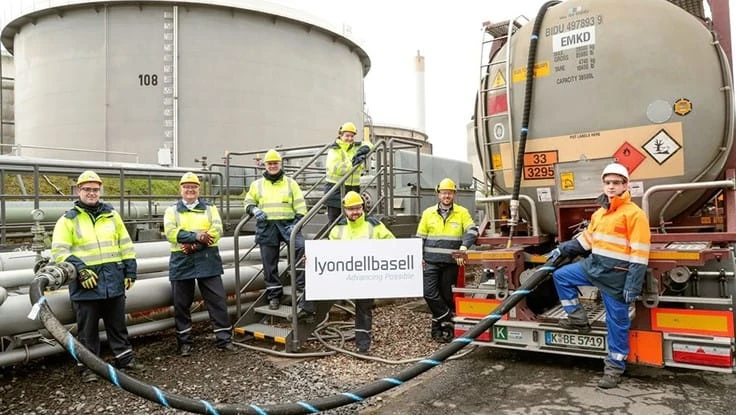
Photo courtesy LyondellBasell
LyondellBasell, a plastics, chemicals and refining company with North American headquarters in Houston, has begun making virgin-quality polymers from raw materials derived from plastic scrap at its Wesseling, Germany, site.
The company, which also has administrative offices in London and Rotterdam, Netherlands, says the polymers are made through thermal conversion of plastic scrap. According to LyondellBasell, raw material is converted into ethylene and propylene in its production facilities and then processed into polypropylene (PP) and polyethylene (PE) in downstream units. The first use of raw material derived from plastic scrap follows the company’s production of plastic materials made from renewable raw materials, such as used cooking oil, helping to reduce CO2 over the product life cycle and reduce the use of fossil-based raw materials.
“By advancing the circular economy requires definitive action and by consistently using these new raw materials in the production of polymers on a commercial scale, we are doing our part to help eliminate plastic waste and address climate change,” says Richard Roudeix, senior vice president of Olefins and Polyolefins for Europe, the Middle East, Africa and India at LyondellBasell. “We are expanding our range of sustainable solutions through our Circulen brand and the use of recycled content, offering our customers a way to use recycled polymers in a wide variety of applications.”
According to a press release from the company, products made from recycled and renewable raw materials will be marketed by LyondellBasell under the Circulen brand name, enabling brand owners to improve the sustainability of consumer products. This will enable the production of high-quality plastics for strictly controlled applications such as food packaging and health care items. LyondellBasell says facilities manufacturing these products are certified according to the International Sustainability & Carbon Certification (ISCC) PLUS standard.
LyondellBasell has pledged to reduce CO2 emissions in its operations worldwide by 15 percent per ton of product produced by 2030 compared with 2015 levels. The company also plans to produce and market 2 million metric tons per year of recycled or renewable-based polymers by 2030.
Additionally, LyondellBasell commissioned a pilot plant last year in Ferrara, Italy, to further develop its molecular recycling technology where plastic scrap is converted into raw materials for the production of new plastics. The goal is to build a possible industrial-scale molecular recycling plant, which will further grow the use of raw material derived from plastic scrap to produce new plastics.
The company says these developments complement LyondellBasell's activities in the field of mechanical recycling. Here, the Dutch joint venture Quality Circular Polymers (QCP) produces Circulen brand. These polymers are used, for example, in electrical appliances, detergent bottles and travel cases.Latest from Waste Today
- Machinex develops Montreal-Est MRF in collaboration with Éco Entreprises Québec
- Liebherr appoints managing director of Liebherr USA Co.
- Michigan governor proposes increased waste disposal surcharge
- Senate’s EPW Committee passes brownfields, recycling legislation
- Viably named authorized Diamond Z distributor in California, Arizona and Nevada
- New York legislators propose resolution to revoke landfill operating permit
- Castillo Engineering selected for landfill solar projects in New York
- Ecomaine seeks award nominees





